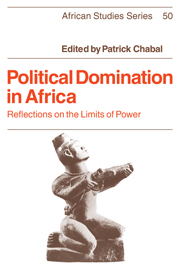Book contents
- Frontmatter
- Contents
- Acknowledgements
- Introduction: Thinking about politics in Africa
- 1 Democracy in Africa
- 2 Politics and vision in Africa: the interplay of domination, equality and liberty
- 3 Democracy and ethnocentrism
- 4 Wails and whispers: the people's voice in West African Muslim politics
- 5 Revolutionary democracy in Africa: the case of Guinea-Bissau
- 6 Civil society in Africa
- 7 Political accountability in African history
- 8 The politics of representation and good government in post-colonial Africa
- Notes
- Index
5 - Revolutionary democracy in Africa: the case of Guinea-Bissau
Published online by Cambridge University Press: 26 January 2010
- Frontmatter
- Contents
- Acknowledgements
- Introduction: Thinking about politics in Africa
- 1 Democracy in Africa
- 2 Politics and vision in Africa: the interplay of domination, equality and liberty
- 3 Democracy and ethnocentrism
- 4 Wails and whispers: the people's voice in West African Muslim politics
- 5 Revolutionary democracy in Africa: the case of Guinea-Bissau
- 6 Civil society in Africa
- 7 Political accountability in African history
- 8 The politics of representation and good government in post-colonial Africa
- Notes
- Index
Summary
Always remember that the people are not fighting for ideas, nor for what is in man's mind. The people fight and accept the sacrifices demanded by the struggle in order to gain material advantages, to live better and in peace, to benefit from progress, and for the better future of their children. National liberation, the struggle against colonialism, the construction of peace, progress and independence are hollow words devoid of any significance unless they can be translated into a real improvement of living conditions.
Amílcar Cabral, Palavras de Ordem Gerais (Conakry: PAIGC, 1969), p. 23For those interested in the fate of socialism in Africa, the history of Guinea-Bissau is of some consequence. It was in 1974 that the PAIGC (Partido Africano da Independencia da Guiné e Cabo Verde) achieved independence following its remarkable success during the war of national liberation. At a time when socialist hopes in Africa had begun to dissolve into despair, Guinea-Bissau stood as a symbol of African prowess, a political regime potentially more capable of sustaining socialist practices than any of its predecessors. Though in Mozambique and Angola (and later in Zimbabwe) the nationalists also emerged victorious from a war of independence, it was Guinea-Bissau which captured the imagination the most, both because of its achievements (political, military and moral) and because of the stature of Amílcar Cabral (founder and leader of the PAIGC), without doubt one of the most able and creative political leaders of modern Africa.
Today, there is debate as to whether the PAIGC in Guinea-Bissau has failed; whether indeed socialism in this small West African country remains as unattainable a goal as ever it was on the rest of the continent.
- Type
- Chapter
- Information
- Political Domination in Africa , pp. 84 - 108Publisher: Cambridge University PressPrint publication year: 1986
- 4
- Cited by

